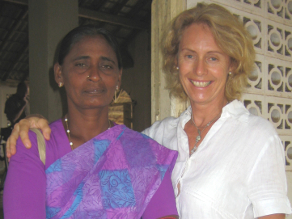By Deborah Loh
thenutgraph.com

Removing the "Islam" label on a MyKAD is not that easy
PETALING JAYA, 15 Dec 2009: Despite cabinet announcements about conversions to Islam and proposed legal amendments to allow a Muslim convert to divorce in the civil court, other scenarios arising from conversions are not being addressed.
As a result, numerous conversion cases are not being resolved and beg the question of how effective the state's response has been to the complex issue of conversion to Islam in Malaysia.
For example, proposed amendments to the Law Reform (Marriage and Divorce) Act 1976 to allow a Muslim convert to end a civil law marriage in the civil court only addresses this one scenario.
Other scenarios have been occurring with no recourse for those affected, lawyer A Sivanesan told The Nut Graph.

A SivanesanSivanesan, who is also a DAP assemblyperson in Perak, related some stories of people who have sought his help in the last two years.
![]() February 2008: A teenaged Indian Malaysian boy from Tapah was converted to Islam by school friends who took him to the religious department where he recited the syahada (proclamation of faith) and received a conversion certificate. He was subsequently given a MyKad which stated "Islam" as his religion.
February 2008: A teenaged Indian Malaysian boy from Tapah was converted to Islam by school friends who took him to the religious department where he recited the syahada (proclamation of faith) and received a conversion certificate. He was subsequently given a MyKad which stated "Islam" as his religion.
His family only discovered his conversion two months later when a sister found his MyKad in a pocket. The boy, now 19, has resumed performing Hindu prayers and wants to leave Islam. But the family, whose father is a prominent businessperson, is not keen to pursue it in court for fear the publicity will damage their name and standing in the Indian Malaysian society.
"They fear that even the chances of marriage for the boy's sisters will be affected," Sivanesan said.
![]() Early 2008: An Indian Malaysian female student at Universiti Kebangsaan Malaysia, Kajang, was converted by university mates. Her father, a teacher, and mother, a homemaker, only learnt of her conversion in her final year of studies.
Early 2008: An Indian Malaysian female student at Universiti Kebangsaan Malaysia, Kajang, was converted by university mates. Her father, a teacher, and mother, a homemaker, only learnt of her conversion in her final year of studies.
The family had wanted to seek legal recourse after her final year exams but the girl "disappeared" with friends for a few days. In the end, the family decided that it was best for her to leave the country. She now works in Singapore.
![]() September to October 2009: A 28-year-old Indian Malaysian Muslim woman by birth from Sitiawan, Perak, wants to be declared a Hindu in order to marry her Hindu fiancé. She says she never practised Islam and was raised a Hindu although she was born to Indian Muslim parents who did not practise Islam. She now wants her religious status in her MyKad changed.
September to October 2009: A 28-year-old Indian Malaysian Muslim woman by birth from Sitiawan, Perak, wants to be declared a Hindu in order to marry her Hindu fiancé. She says she never practised Islam and was raised a Hindu although she was born to Indian Muslim parents who did not practise Islam. She now wants her religious status in her MyKad changed.
![]() November 2009: A non-practising Indian Malaysian Muslim wife and Hindu husband in Klang are considering legal recourse to obtain a MyKad for their 12-year-old son which does not state "Islam" as his religion. The father is a factory worker and the mother works in a textile shop in Klang.
November 2009: A non-practising Indian Malaysian Muslim wife and Hindu husband in Klang are considering legal recourse to obtain a MyKad for their 12-year-old son which does not state "Islam" as his religion. The father is a factory worker and the mother works in a textile shop in Klang.

Children raised as non-Muslims have MyKads
stating "Islam" as their religion
(© jmhullot / Wiki Commons)Sivanesan also has a 26-year-old niece, who converted to Islam to marry, who is now a single mother with two children after her Muslim husband from Bangladesh abandoned her four years ago. The niece has returned to Hinduism but her MyKad states that she is Muslim.
Sivanesan said these stories have not been made public out of fear that the publicity will be more damaging to those affected, than helpful.
He added that many who get caught in this quandary chose to keep quiet because of the difficulty in finding syariah lawyers to represent them.
Those who engage civil lawyers, or want to challenge the validity of conversions, become embroiled in the jurisdictional tussle between civil and syariah courts.
"Civil lawyers can't represent such clients in the syariah court where only syariah-compliant lawyers may appear. There are few syariah lawyers who are sympathetic as most feel they would be going against Islam if they were to take up conversion cases," Sivanesan said in an interview at his Brickfields office.
No more deed polls

The National Registration Department now pushes the matter of removing "Islam" from
MyKads to the courts (left silhouette © Michal Zacharzewski / sxc.hu,
right silhouette © Kriss Szkurlatowski / sxc.hu)
Sivanesan said that until the late 1980s, people could use deed polls to apply to the National Registration Department to remove "Islam" from their identity cards. Now, the department pushes the matter to the courts.
However, in a rare recent case, a deed poll was successfully recognised by the Court of Appeal.
In its judgment in June 2009, the court allowed a person who was deemed a Muslim to challenge his or her status in the civil High Court.
It was the case of storekeeper Zaina Abidin Hamid alias S Maniam, whose originating summons was struck out by the High Court but reinstated by the Court of Appeals. He sought for himself and his children to be recognised as Hindus and by their Hindu names, stating that he had professed Hinduism all his life.
Maniam was born to Indian Malaysian parents who had identity cards which said they were Muslims. He said his parents followed the Hindu way of life and raised him as a Hindu. In 1973, he obtained a deed poll to adopt a new Hindu name. He also married a Hindu woman under civil marriage laws.
His case, however, received little media coverage.
Courts decide

K ShanmugaLawyer K Shanmuga said he noticed a shift in government policy that has affected the MyKad registration of illegitimate children after the Federal Court decision on Lina Joy in May 2007.
Previously, children born out of wedlock to a non-Muslim mother and a Muslim father were issued identity cards that did not state their religion as Islam. They were also allowed to change their Muslim names and their status as Muslims in their identity cards.
"At one time, this could be done without the need to go to the syariah court to decide the child's religion.
"About 10 years ago, I had a case where the religious council agreed that children born to a non-Muslim mother and Muslim father had to follow the mother. Both Islamic and civil law say the 'putative' father of an illegitimate child has no rights over that child.
"But now the government is insisting that the children have to go to the syariah court if they want to remove their classification as Muslim," said Shanmuga, who is currently handling a number of such cases with clients who are now above 18 who want to change their MyKads.
Shifting ground
Shanmuga said "things started to change as far as the law was concerned" in the 1990s, with the minority decision in the Dalip Kaur v Pegawai Polis Daerah Bukit Mertajam judgment. In that case, the court ruled that apostasy from Islam required the deliberation of Islamic law scholars. Hence, the syariah court should have jurisdiction to hear such matters, the civil court decided then.
That minority decision influenced judgment for the Soon Singh v Perkim Kedah case in 1999, which in turn influenced the Lina Joy decision.
"These problems have been on-going. These people continue living their lives thinking there is no need to do anything until they run into problems when they want to get married, or have children," Shanmuga said



 Kulasegaran, also the DAP vice-chairperson, named the daily and its writer Awang Selamat over the article which he claimed can incite racial hatred and cause public unrest in this country.
Kulasegaran, also the DAP vice-chairperson, named the daily and its writer Awang Selamat over the article which he claimed can incite racial hatred and cause public unrest in this country. Also present was A Rajaretinam, president of the Federation of Malaysian Indian Organisations, better known as Prima. He questioned why the paper played the racial card, inciting racial animosity.
Also present was A Rajaretinam, president of the Federation of Malaysian Indian Organisations, better known as Prima. He questioned why the paper played the racial card, inciting racial animosity.



















 KUALA LUMPUR: The lawyer for private investigator P. Balasubramaniam recently offered his help to the Malaysian Anti-Corruption Commission (MACC) in its investigation into his client’s allegations of blackmail and bribery that implicate people close to the Prime Minister and his wife.
KUALA LUMPUR: The lawyer for private investigator P. Balasubramaniam recently offered his help to the Malaysian Anti-Corruption Commission (MACC) in its investigation into his client’s allegations of blackmail and bribery that implicate people close to the Prime Minister and his wife. KUALA LUMPUR, Dec 14 — Datuk Seri Anwar Ibrahim stood by his views contained in a leaked video of the National Civics Bureau (BTN) which was made available in Umno-owned blogs, saying its courses have gotten worse now.
KUALA LUMPUR, Dec 14 — Datuk Seri Anwar Ibrahim stood by his views contained in a leaked video of the National Civics Bureau (BTN) which was made available in Umno-owned blogs, saying its courses have gotten worse now. IPOH, Dec 14 — The recent spate of racial politicking allegedly instigated by non-Malay politicians in the Opposition, seems to have triggered an internal war among the Malay community, creating a widening rift between two factions — the pro-Pakatan Rakyat (PR) Malays and the pro-Barisan Nasional (BN) Malays.
IPOH, Dec 14 — The recent spate of racial politicking allegedly instigated by non-Malay politicians in the Opposition, seems to have triggered an internal war among the Malay community, creating a widening rift between two factions — the pro-Pakatan Rakyat (PR) Malays and the pro-Barisan Nasional (BN) Malays.